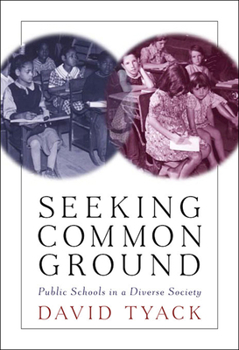Seeking Common Ground: Public Schools in a Diverse Society
Select Format
Select Condition 
Book Overview
The American republic will survive only if its citizens are educated--this was an article of faith of its founders. But seeking common civic ground in public schools has never been easy in a society where schoolchildren followed different religions, adhered to different cultural traditions, spoke many languages, and were identified as members of different "races."
In this wise and enlightening book, filled with vivid characters and memorable incidents that make history but don't always make history books, David Tyack describes how each American generation grappled with the knotty task of creating political unity and social diversity. Seeking Common Ground illuminates puzzles about democracy in education and chronic conflicts that continue to make news. Americans mistrusted government, yet they entrusted the civic education of their children to public schools. American history textbooks were notoriously dull, but they were also highly controversial. Although the people liked local control of schools, educational experts called it "democracy gone to seed" and campaigned to "take the schools out of politics." Reformers argued about whether it was more democratic to teach all students the same subjects or to tailor curriculum to individuals. And what was the best way to "Americanize" immigrants, asked educators: by forced-fed assimilation or by honoring their ethnic heritages? With a broad perspective and an eye for telling detail, Tyack lets us see that debates about the civic purposes of schools are an essential part of a democratic culture, and integral to its future.Format:Paperback
Language:English
ISBN:0674024206
ISBN13:9780674024205
Release Date:April 2007
Publisher:Harvard University Press
Length:256 Pages
Weight:0.66 lbs.
Dimensions:0.7" x 5.6" x 8.3"
Customer Reviews
3 ratings
Part History Lesson, Part Treatise, Excellent Book
Published by Thriftbooks.com User , 15 years ago
David Tyack, the Vida Jacks Professor of Education and Professor of History Emeritus at Stanford University, melds his expertise brilliantly in his book Seeking Common Ground: Public schools in a diverse society. Part history lesson and part educational treatise, Tyack argues for the importance of schools as civic spaces that ultimately sustain democracy. Tyack spends the greater part of the book examining the tense and often troubled past of American schooling within both ethnic and religious contexts. Neither overly critical nor overly optimistic in his assessment of schooling, Tyack issues a clarion call to all citizens that our democracy rests on an ability and willingness to make schools better. Although at times loquacious, Tyack's claims are well taken. So well, in fact, that educators and non-educators alike should be able to get beyond his verbose style and really enjoy reading this book. A common theme in Seeking Common Ground, what Tyack calls "the search for common ground amid controversy and ethnoreligious diversity" (p. 183), is situated around three key issues: 1) the ways in which school leadership attempted to create citizens through schooling, 2) how diversity has been dealt with by school leadership, 3) and the ways in which schools have been governed. Each of these three issues is covered through historical analysis of textbook use, changing philosophical foundations, and power struggles in schools and school districts. Tyack is critical yet fair in his interpretation of history by painting a picture that schools have never really gotten it right, yet they have also not failed entirely. This articulation allows the text to carry a cautious optimism. At the core of Seeking Common Ground is a critique of educational leadership's preoccupation with functionalism. As Tyack lays out his historical analysis it becomes clear that he is framing his critique within a critical perspective, aiming his analyses directly at the ways in which functionalism is manifest in educational policy and practice. Tyack is successful in his effort to portray this struggle. Through his interpretation of history it can be understood that the aims of education have always rested on shifting sand and the winds of socio-cultural discourse often create tension and, at times, chaos. In other words, educational policy makers and school leaders have never gotten it right, and probably never will, but the struggle is necessary in creating and sustaining liberal democracy. Also at the center of Seeking Common Ground is a critique of the "melting pot" pathology exerted toward those deemed "other." As Tyack illustrates time and again, white male Protestants have used the school as a device to manipulate and control anyone outside of their own group, even white Protestant women. Whether it is through the explicit use of public policy against ethno-religious difference, or implicitly through textbooks and their propagation of historical meta-
Seeking Common Ground:Public Schools in a Diverse Society
Published by Thriftbooks.com User , 16 years ago
Excellent resource for introductory Education classes. In depth discussion in many areas of the public school mentality, expectations, and culture.
Short, persuasive, inspiring!
Published by Thriftbooks.com User , 21 years ago
Tyacj makes a short persuasive case for not getting discouraged, persisting at the task--and keeping our aim on the "common ground"--democracy. It's a wonderful read. Thank goodness this book, as well as so much else he's written, is there for us.





